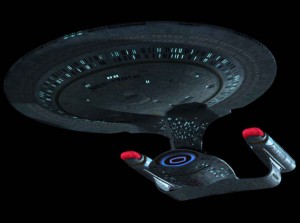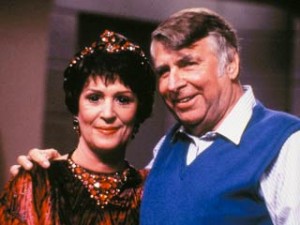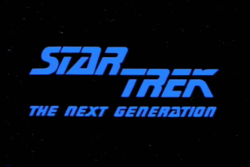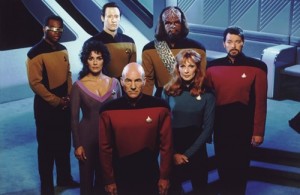Before we begin looking at Star Trek: The Next Generation, I think we should review the cast of characters and address what Star Trek is really about…just so that I don’t have to keep repeating myself.
If you’re an avid reader of my blog, then you are probably aware of the Star Trek: The Original Series episodes I’ve reviewed over the past six months. I’ve touched on mainly my favorites, though most of them are good in their own right. Most people are unable to get past the cheesiness factor and the lack of modern-day action sequences, but it’s important to understand what Star Trek truly stands for.
Fun Fact: Gene Roddenberry (right) was married to Majel Barrett (left) who played a number of roles in Star Trek. Mainly, Nurse Chapel in the Original Series, the voice of the Enterprise computer in every series, and as Deanna Troi’s mother in The Next Generation. She also played as the unnamed first officer during the pilot of Star Trek (The Cage), when Jeffrey Hunter was in charge of the Enterprise as Captain Christopher Pike.
Gene Roddenberry did not create Star Trek to appeal to those that have John Rambo posters on their wall…he created the show to appeal to the free thinkers of the generation and to address certain moral issues going on in the 60′s. People who say that there aren’t enough action sequences and sparkly vampire love triangles are missing the point completely.
“Let This Be Your Last Battlefield” was a Star Trek: The Original Series episode that featured two aliens of different racial features that lived on the same planet. One alien was black on the left side of his face and white on the other, while the other alien was white on the left side of his face and black on the other. Even though the episode did not feature any major battles and may have bored the Average Joe, it successfully touched on racism, which as you know, is still running rampant in today’s society. The end of the episode was eye-opening when the two aliens discovered that their home planet had destroyed itself from the wars created by their own people’s shortsightedness. As a kid, I thought nothing of it and regarded it as boring. As an adult, I realized that Earth could suffer the very same fate should we choose not to grow past our own bigotry.
Star Trek: The Next Generation stays true to the formula. Yes, it does have some action sequences…but its main focus was telling a science fiction story while trying to convey and resolve moral dilemmas.
Captain Jean Luc Picard (Patrick Stewart) takes the bull by the horns in a completely different manner than Captain James T Kirk. Captain Kirk would have ripped his shirt…twice…taken out a phaser, stunned the bull, waited until it woke up, then beat it with the blunt end of a five dollar prop. Captain Picard would have ordered Earl Grey Tea (hot), pulled his uniform down to straighten it out (The Picard Maneuver), and read the bull Shakespeare until it committed ritual suicide. Captain Picard is a diplomat at heart and often takes the role of the all-knowing grandfather that has all of the answers to various moral issues.
Commander William T Riker (Jonathan Frakes), the first officer, reminded me more of Kirk…tall, rebellious, and a ladies man. He was obviously created to provide a balance to the extremely seasoned (aka rigid) Captain Picard. In fact, Picard chose him as his first officer due to the fact that Riker had disobeyed his former Captain because he thought it would save lives. Again…Picard knows best.
Lieutenant Commander Data (Brent Spiner) is probably my favorite of the show. He’s an android without feeling or emotion and regards his surroundings in a childlike innocence, trying to become more human. Data gave the viewers someone to relate to. I say that because you have to remember that in Star Trek, everything about the Federation is quote unquote perfect…poverty, disease, war, all of it has been eliminated…so what could you possibly write about for seven seasons? Data grounds the viewer as he attempts to understand those very concepts for himself…just as we are struggling to do.
Lieutenant / Lieutenant Commander Geordi LaForge (LeVar Burton) was someone who I immediately recognized from Reading Rainbow, having watched that show as a kid. LeVar plays a blind character and the “VISOR” that he wears was actually one of the more difficult things for the show’s creators to invent. After spending a lot of time in development, they decided to fashion the VISOR after a woman’s banana clip of all things. Whatever works. Geordi is portrayed as a down to Earth likable guy who originally manned navigation and later became chief engineer. The latter was definitely the better fit, in my opinion.
Lieutenant Worf (Michael Dorn) was the first Klingon in Starfleet. His parents were killed at a young age so he was raised by human foster parents, which makes his character a bit more interesting than “Hulk Smash.” Yet, out of all of the characters, he was the one to enjoy laughing in the face of diplomacy…at least, until his later years. He took over as chief of security when Tasha Yar (Denise Crosby) died in the first season. He ended up playing a major role on Star Trek: Deep Space Nine as well.
Deanna Troi (Marina Sirtis) is half human, half Betazoid. Betazoids can sense emotions and are telepaths, some better than others. Her role in the show has been mainly to provide a sounding board as the ship’s counselor and on occasion, provide insight into the other party during negotiations. She was the one person Picard went to when he, himself, had trouble working out a moral dilemma. She also went through about three hundred dresses and uniforms, some of which made her look like an “intergalactic cheerleader”, until they found one that was well received.
Doctor Beverly Crusher (Gates McFadden) is the mother of Wesley Crusher (Wil Wheaton) and involved in a long and not-so-forgotten love interest between herself and Picard. She was absent from the show during the second season but returned for the third and subsequent seasons, mainly due to urgings from Patrick Stewart. She was a strong character in that she provided motherly advice for both her son Wesley and on occasion Data, who as I mentioned, often saw things through the eyes of a child.
There are of course, more characters to mention like Chief O’Brien, Wesley Crusher, Lieutenant Reginald Barclay, Guinan as played by Whoopi Goldberg…but I’d be here all day if I did. If they come up in episodes I’m reviewing, I’ll touch on them then.
The ship these characters served on during the show was the USS Enterprise, NCC 1701-D. As a bit of history, Kirk and company served on the NCC 1701 and the NCC 1701-A (after the destruction of the original in Star Trek III). The NCC 1701-B made a short appearance in Star Trek: Generations (The seventh movie which I have yet to review) and was captained by John Harriman. The NCC 1701-C made a brief appearance in an episode of the Next Generation and was captained by Rachel Garrett.

The USS Enterprise NCC 1701-D…it lacks the sharp curves of the original, but it’s still pretty majestic.
The Enterprise D, like its predecessors, is a ship of exploration. It also serves as the flagship of the fleet and houses over a thousand men and women, though some of those are civilians. The Enterprise D was the first of her line to house families, which has been both an advantage and a disadvantage during some of the episodes.
The show itself lasted for seven seasons, more than double of that of the Original Series which lasted only three. I’m not sure how I am going to review this all yet…I probably will opt to review one season at a time, as a whole. Not only would creating an article for every episode be an undertaking, I would probably be blocked by a third of my Facebook friends and quite possibly the entire internet.
At any rate, there you have it. Stay tuned (or don’t) for my thoughts on Season One. Engage!



